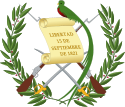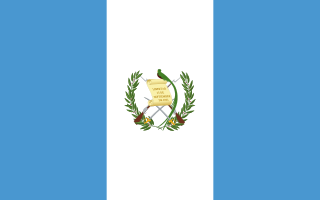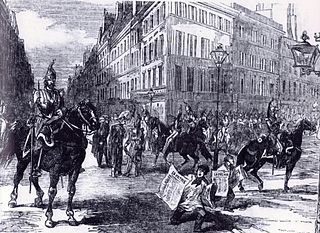
A referendum on the Matignon Accords on New Caledonia was held in France on 6 November 1988. The accords were approved by 80% of voters, although turnout was just 36.9%. In New Caledonia it was approved by 57% of voters.

A constitutional referendum was held in France on 5 May 1946. Voters were asked whether they approved of a new draft Constitution proposed by the Constituent Assembly elected in 1945.

A constitutional referendum was held in France on 13 October 1946. Voters were asked whether they approved of a new constitution proposed by the Constituent Assembly elected in June. Unlike the May referendum, which saw a previous constitutional proposal rejected, the new constitution was accepted by 53.2% of voters, and brought the French Fourth Republic into existence. Voter turnout was 67.6%.

A constitutional referendum was held in France on 28 September 1958. Voters were asked whether they approved of the adoption of a constitution for the French Fifth Republic written by Charles de Gaulle. It was overwhelmingly approved, with 82.6% in favour. Voter turnout was 84.9% in Metropolitan France and 79.8% overall.

A constitutional referendum was held in France on 8 May 1870. Voters were asked whether they approved of the liberal reforms made to the constitution since 1860 and passed by the Sénatus-consulte on 20 April 1870. The changes were approved by 82.7% of voters with an 81.3% turnout. However, France's defeat in the Franco-Prussian War caused the Empire to be abolished later that year. Despite this being the ninth constitutional referendum in French history, it was the first to have more than 8% oppose the motion, and one of only four to have less than 99% official approval.
A constitutional referendum was held in Denmark on 6 September 1920. It was held in order to make changes to the constitution of Denmark from 1915 that had been made necessary to facilitate the reunification of Southern Jutland into the kingdom of Denmark. The changes were approved by 96.9% of voters, with a 49.6% turnout. A total of 614,227 of the 1,291,745 registered voters voted in favour, meaning that 47.6% of eligible voters had voted for the proposals, above the 45% required by the constitution.

A constitutional referendum was held in Chile on 30 June 1989. The proposed changes to the constitution were approved by 91% of voters.

A constitutional referendum was held in Poland on 25 May 1997. Voters were asked whether they approved of a new constitution. It was narrowly approved, with 53.5% voting in favour. Voter turnout was just 42.9%. Although the 1995 Referendum Act stated that a 50% turnout was required to validate the referendum, the Supreme Court ruled on 15 July that the constitution could be introduced.
A referendum on convening a Constitutional Assembly was held in Venezuela on 25 April 1999. Voters were asked two questions;
- Should a Constitutional Assembly be convened?
- Do you agree with the President's suggestion of how the Assembly should be elected?
A constitutional referendum was held in Estonia between 14 and 16 October 1933. After two new constitutional drafts proposed by Parliament had been rejected by referendums in 1932 and June 1933, a third draft proposed by the radical right-wing Movement of Veterans of the War of Independence was approved by 72.7% of voters, with a turnout of 77.9%.
A referendum on a new constitution and citizenship was held in Estonia on 28 June 1992. Voters were asked whether they approved of the new constitution drawn up by the Constitutional Assembly and extending suffrage to people registered as citizens. The new constitution was approved by 91.9% of voters, whilst the suffrage extension was rejected by 53.5%. Voter turnout was 66.8% for the constitution question and 66.7% for the suffrage question.

A constitutional referendum was held in Romania on 8 December 1991. The new constitution was approved by 79.1% of voters.

A constitutional referendum was held in Romania on 18 and 19 October 2003. The proposed amendments to the constitution were approved by 91.1% of voters.

Parliamentary elections were held in Romania on 9 March 1975. The Front of Socialist Unity, dominated by the Romanian Communist Party and including other mass organisations, was the only organisation that contested the election. No prospective candidate could run for office without the Front's approval. The Front won all 349 seats in the Great National Assembly.
A constitutional referendum was held in Switzerland on 31 October 1880. The constitutional amendments were rejected by 68.2% of voters and a majority of cantons.
A constitutional referendum was held in Switzerland on 25 October 1885. The constitutional amendments were approved by 59.4% of voters and a majority of cantons.
Two referendums were held in Switzerland in 1887. The first was held on 15 May, asking voters whether they approved of a federal law on spirits, and was approved by 65.9% of voters. The second was held on 10 July, asking voters whether they approved of an amendment made to article 64 of the federal constitution, and was approved by 77.9% of voters and 20.5 cantons.
Five referendums were held in Switzerland in 1891. The first was held on 15 March on a federal law on federal officials who had become unemployable due to disability, and was rejected by 79.4% of voters. The second was held on 5 July on a constitutional amendment, and was approved by 60.3% of voters. Two referendums were held on 18 October, one on revising article 39 of the federal constitution and one on a federal law on Swiss tariffs; both were approved. The last was held on 6 December on the question of whether the federal government should purchase the Swiss central railway, but was rejected by 68.9% of voters.
A double referendum was held in Switzerland on 15 May 1927. Voters were asked whether they approved of amending article 30 of the constitution and a federal law on car and bicycle traffic. The constitutional amendment was approved by voters, whilst the traffic law was rejected.
Two referendums were held in Switzerland during 1928. The first was held on 20 May, asking voters whether they approved of amending article 44 of the constitution regarding measures against foreign infiltrators, and was approved by a majority of voters and cantons. The second was held on 2 December, asking voters whether they approved of the "Kursaalspiele" popular initiative on gambling, and was also approved.








